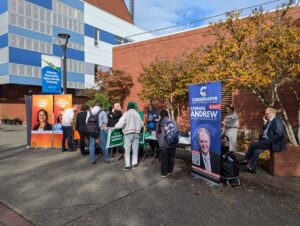The provincial election is just days away, with advance voting well underway. While many people are gearing up to vote for the New Democratic Party (NDP) or the Conservative Party, there are other players to keep in mind. Someone from the Green Party isn’t likely going to land the seat of premier, but Green Party deputy leader Lisa Gunderson, who is also running to be MLA for Oak Bay-Gordon Head, feels strongly that that doesn’t mean voting for them would be throwing away your vote.
Gunderson’s stance is that for representational democracy to work, you have to vote for the candidate who best represents your values, rather than voting for who you think has the best shot at beating the candidate you don’t want.
“I understand people having fear,” says Gunderson. “I have fears, but you can’t, in my opinion, vote for fear.”

Gunderson describes herself as a realist, and says that the Greens know they’re not going to form government but can hold the balance of power.
“I think that’s the thing that catches people,” she says. “It’s like, we know that. We don’t have the numbers to do that. What we do have the numbers to do is hold whoever gets in accountable… as opposed to these two groups just beating each other up all day long, which isn’t going to help.”
Canada has a tendency to look through the lens of the two-party system of the United States. This isn’t reflective of the system that’s actually in place, although the way Canadians vote seems to show people cling to the American framework.
“The Canadian system, it needs to shift if it wants to be what it’s purporting to be in terms of a multi-party system,” says Gunderson. “If you’re truly going to be a true multi-party system, you have to have proportional representation, so all voices can be heard and represented.”
Gunderson says she isn’t alone in feeling this way—she says she has conversations with people who are similarly frustrated with the way they’re represented.
“I talked to somebody yesterday who’s like, I am so frustrated at this point that I’m thinking maybe I just shouldn’t vote at all,” she says. “And that’s not okay, because what we have right now is a minority, you get 40, 45 percent getting all the power, the majority. That means the majority of people didn’t want you.”
Gunderson says that it’s strategically unwise as well.
“If you think about it, if the worst-case scenario happens for either side, for the NDP, the Conservatives come in, or for the Conservatives, the NDP come in, those two are going to be just battling each other,” she says. “Nobody’s going to be interested in having conversations or talking, because both sides are going to want to either keep their power or stay in, so they can’t give any leeway to the other side, and vice versa. Those two aren’t going to talk to each other, but those two talk to us.”
The Green Party states that young people show high numbers of support for their policies.
“When we look at polls from young people and youth, they are Green leaning,” says Gunderson. “It makes sense, not only because of climate change being on top of mind, but the values [of the Green Party], those tend to really resonate with youth and young people… Social justice as a pillar, respect for diversity as a pillar, non-violence, sustainability and ecological wisdom, and then participatory democracy.”
Despite this support, Gunderson says she still regularly finds herself in conversation with people who voted out of fear, and found themselves frustrated with the results.
“I met somebody who voted strategically, and… She’s like, wow, I didn’t really need to buy into the fact that if I didn’t vote for this one MLA, the whole thing would collapse. So she said, then I spent the next four years just mad that I didn’t put my vote where my value was.”
Gunderson wants to see people making choices that reflect what they want, rather than what they don’t.
“People have to fundamentally decide if they want their vote to truly represent their voice, right? Vote for what you believe in, vote for the British Columbia you want to see, you know? I just don’t want people to vote out of fear. You have to have faith.”
Correction: An earlier version of this story indicated that Gunderson had said the Greens can not hold balance of power, when in fact Gunderson said they could. We apologize for the mistake.
